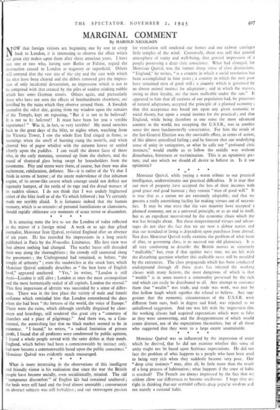Monsieur Queval, while paying a warm tribute to our practical
intelligence, underestimates our practical difficulties. It is true that our men of property have accepted the loss of their incomes with good grace and good humour ; they remain " men of good will." It is true that as a nation we are extremely adaptable, and that we possess a really astonishing facility for making virtues out of necessi- ties. It may be true ever that the vast majority have accepted a planned economy, not as a universal principle, or as an end in itself, but as an expedient necessitated by the economic chaos which the war has brought about. But these temperamental virtues and advan- tages do not alter the fact that we are now a debtor nation and that our standard of living is dependent upon purchases from abroad. Nor does Monsieur Queval really examine the problem of what form of elite, or governing class, is to succeed our old plutocracy. It is all very comforting to describe the British masses as extremely "malleable," but, even if that epithet were true, we are left with the disturbing question whether this malleable mass will be moulded by the extremists. The class propaganda which has been conducted underground through all these years has infected the working classes with many fictions, the most dangerous of which is that " wealth " is in some manner a commodity possessed by the rich and which can easily be distributed to all. Any attempt to convince them that " wealth " was trade, and trade was work, was met by that hollow laugh which signifies the refusal to believe. Any sug- gestion that the economic circumstances of the U.S.S.R. were different from ours, both in degree and kind, was rejected as an unhallowed suggestion. And one was left with the impression that the working classes had acquired expectations which were as false as they were unwavering, and the disappointment of which would create distrust, not of the expectations themselves, but of all those who suggested that they were to a large extent unattainable. * * * *






























 Previous page
Previous page